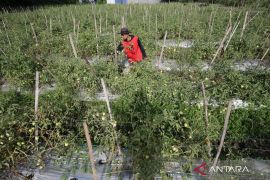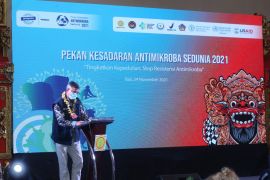Bogor, W Java, Feb 8 (ANTARA News) - The Food and Agriculture Organization of the United Nations (FAO) has worked with the Indonesian Ministry of Agriculture and Dompu district government to train animal health officers to control rabies outbreak in the regency.
The rabies outbreak in Dompu District, West Nusa Tenggara Province, has demonstrated the importance of capacity building for the related authorities, FAO Representative in Indonesia Stephen Rudgard remarked in a press statement made available to Antara on Friday.
"The outbreak of rabies in Dompu is very unfortunate and demonstrates the need to develop capacities within the local government, and especially the animal health service, to detect and respond to a priority disease, such as rabies," he emphasized.
In dealing with this problem, the Ministry of Agriculture`s Directorate General of Livestock and Animal Health Services (DGLAHS) has taken immediate actions to control the current rabies outbreak in the district.
The directorate has dispatched a joint veterinary team to conduct investigations and immediate vaccination of dogs against rabies and convened a vaccination training for the district`s livestock and human health officers.
The vaccination training was co-organized by the DGLAHS and the Emergency Center for Transboundary Animal Diseases of the Food and Agriculture Organization of the United Nations (FAO ECTAD).
The two parties also held a training on the Procedures for Integrated Bite Case Management to enhance the knowledge and hone the skills of officers to prevent and control rabies in Sumbawa Island.
"The FAO is pleased to collaborate with the DGLAHS Ministry of Agriculture and Dompu Regency to train animal health officers and to increase community awareness," Rudgard stated.
Meanwhile, Head of the Dompu District Health Office Iris Juita Kastianti urged local residents bitten by dogs to visit health centers immediately and to complete their vaccination courses.
Unfortunately, people did not immediately report to health posts once they got bitten. Even after receiving the first vaccine treatment, several patients did not return to the district`s health centers to complete their vaccination courses, she pointed out.
"After visiting a health center, a patient receives a mandatory rabies control card. The patient must return to the health centers on specified dates for additional vaccination. If they do not complete the course of vaccination, the result could be very dangerous," she cautioned.
"Non-treated patients could die anywhere between two weeks to two years following a bite from a rabid dog. The community still lacks this information about rabies," she was quoted as saying.
Dompu District had been declared a rabies-infected area on January 27, 2019. The district`s Livestock and Animal Health Services recorded 544 dog bite cases from potential rabies vector animals between late 2018 and early February 2019.
In controlling dog rabies in Dompu, the related authorities also conducted a public awareness campaign by holding a gathering on Friday that was attended by the dog-owning community along with farmers and hunters.
The participants were briefed on rabies and its prevention and control and called on to support more widespread dog vaccination programs to prevent rabies, the FAO revealed.
Editing by Eliswan Azly
Reporter: Rahmad Nasution
Editor: Suharto
Copyright © ANTARA 2019











